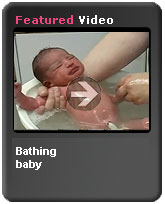Ear Piercing:
Many mums would like to have their baby girls ears
pierced at an early age. There are two camps of thoughts
on when it should be done. One camp believes that
piercing in the months of life is not advisable, as
baby's immune system is not fully developed. The second
camp believes if a sterile technique with other safety
measures are used, it is OK.
Prevention against infection: Go to a person experienced
in piercing babies. Use 14k gold posts to avoid allergic
reaction, as some babies are known to react against
sterling silver or stainless steel posts. Keep the
area clean after the procedure. Strep or staph bacteria
can enter open wounds causing red and swollen earlobes,
which is only treatable with antibiotics.
Choose the right earrings: With the piercing done,
your next concern will be the earring choice. Screw-on
back is a better option, as they don't come off easily
when baby starts to play with her ears. She may put
the loose part in her mouth and choke on it.
Word of caution: Some doctors advise piercing when
baby is at least 4 months old, after having received
at least two shots of Dtap (diphtheria, tetanus and
pertussis)
Solids to induce Sleep:
A friend or relative may wrongly advise you on your
baby requiring solid food to sleep better and longer.
Babies should not be given anything besides milk until
he turns 4-5 months old. Baby is not going to gain
nutritionally or sleep longer if he goes on solids
this early; on the contrary tummy aches can develop
since the digestive system is not equipped to deal
with other foods. This will defeat the purpose and
keep the ailing baby up all night instead.
 Fluoride Supplementation
Fluoride Supplementation:
For healthy development of teeth babies need fluoride.
Bring up this issue with your pediatrician. Most pediatricians
begin the supplement when baby is about 6 months old.
Dosage depends on fluoride content in your water supply
and whether baby is receiving any of that water. For
example, powdered formula is made with water compared
to breast milk or ready-to-use formula, and that may
determine when to begin supplementation. Too much
fluoride can cause discolored or mottled teeth so
it is best to receive your pediatrician's guidance
on this.
Baby's Soft Spots:
Soft spots on baby's head enable his head to grow.
The spot at the back of his head should close about
now. The bigger one at the top of baby's head takes
longer to close; it usually hardens completely after
baby turns 18 months old. It is ok to touch these
spots gently. If the fontanel sinks in or bulges or
hardens before it should, call your pediatrician for
an assessment.
Baby-proofing your
home:
Think now, before baby is mobile, about baby proofing
your home. Some people believe that nothing should
be moved or put away as this will train baby on what
he can and cannot touch. Other parents believe that
anything baby might reach should be removed so you
never have to deny your baby anything. The middle
road is best; you don't have to put away everything
your baby might reach or touch. Store away breakables,
valuables and dangerous items for a while. Put only
what is safe around the house. Sooner or later, your
baby has to understand and learn 'No'. Let the practice
begin on safe objects that don't pose any danger.
This way baby expands his horizons without causing
damage and endangering himself along the way.
Smoking and Baby:
Smoking harms baby. Secondary smoke itself contains
more than 200 poisonous substances, which your baby
breathes in each time you or someone else lights a
cigarette near him. It is advisable to quit the habit.
Baby develops many complications such as respiratory
infections, asthma, breathing problems, middle ear
infections. It also contributes to the development
of SIDS (sudden infant death syndrome). In addition
accidents can happen where the smoker may accidentally
burn him with a lit cigarette. If you and other members
cannot give up the habit, be sure not to smoke around
baby or anywhere else in the house. Smoke outside.
Never smoke in enclosed spaces such as cars when baby
is with you. Avoid smoke-filled areas whenever possible
such as restaurants or public areas where smoking
is allowed. Make sure your baby is protected at child-care
centers as well.
Toy Hazards:
Start paying attention to toy details from now on,
as your baby is growing older and the potential for
hazard increases. Avoid toys with small parts to it
such as eyes or nose that your baby might pull off
a stuffed toy. Avoid toys that are too small or have
small loose pieces to them.